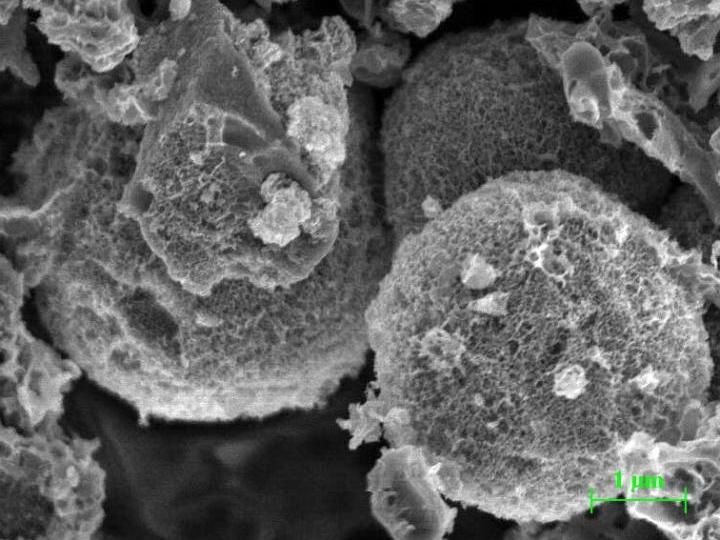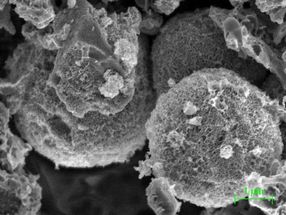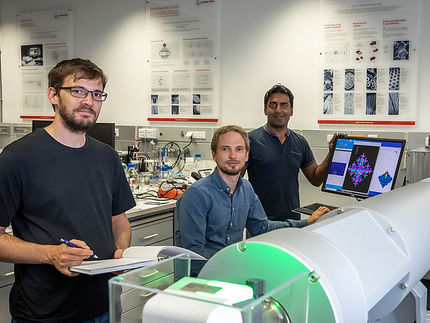High-tech electronics made from autumn leaves
Northern China's roadsides are peppered with deciduous phoenix trees, producing an abundance of fallen leaves in autumn. These leaves are generally burned in the colder season, exacerbating the country's air pollution problem. Investigators in Shandong, China, recently discovered a new method to convert this organic waste matter into a porous carbon material that can be used to produce high-tech electronics.

Phoenix tree (Paulownia imperialis) leaves.
US National Park Service, Public Domain

Scanning Electron Microscopy (SEM) image of porous carbon microspheres.
Hongfang Ma, Qilu University of Technology


The investigators used a multistep, yet simple, process to convert tree leaves into a form that could be incorporated into electrodes as active materials. The dried leaves were first ground into a powder, then heated to 220 degrees Celsius for 12 hours. This produced a powder composed of tiny carbon microspheres. These microspheres were then treated with a solution of potassium hydroxide and heated by increasing the temperature in a series of jumps from 450 to 800 C.
The chemical treatment corrodes the surface of the carbon microspheres, making them extremely porous. The final product, a black carbon powder, has a very high surface area due to the presence of many tiny pores that have been chemically etched on the surface of the microspheres. The high surface area gives the final product its extraordinary electrical properties.
The investigators ran a series of standard electrochemical tests on the porous microspheres to quantify their potential for use in electronic devices. The current-voltage curves for these materials indicate that the substance could make an excellent capacitor. Further tests show that the materials are, in fact, supercapacitors, with specific capacitances of 367 Farads/gram, which are over three times higher than values seen in some graphene supercapacitors .
A capacitor is a widely used electrical component that stores energy by holding a charge on two conductors, separated from each other by an insulator. Supercapacitors can typically store 10-100 times as much energy as an ordinary capacitor, and can accept and deliver charges much faster than a typical rechargeable battery. For these reasons, supercapacitive materials hold great promise for a wide variety of energy storage needs, particularly in computer technology and hybrid or electric vehicles.
The research, led by Hongfang Ma of Qilu University of Technology, has been heavily focused on looking for ways to convert waste biomass into porous carbon materials that can be used in energy storage technology. In addition to tree leaves, the team and others have successfully converted potato waste, corn straw, pine wood, rice straw and other agricultural wastes into carbon electrode materials. Professor Ma and her colleagues hope to improve even further on the electrochemical properties of porous carbon materials by optimizing the preparation process and allowing for doping or modification of the raw materials.
The supercapacitive properties of the porous carbon microspheres made from phoenix tree leaves are higher than those reported for carbon powders derived from other biowaste materials. The fine scale porous structure seems to be key to this property, since it facilitates contact between electrolyte ions and the surface of the carbon spheres, as well as enhancing ion transfer and diffusion on the carbon surface. The investigators hope to improve even further on these electrochemical properties by optimizing their process and allowing for doping or modification of the raw materials.
Original publication
Most read news
Original publication
Hongfang Ma and Zhibao Liu and Xiaodan Wang and Changcun Zhang and Rongyan Jiang; "Supercapacitive performance of porous carbon materials derived from tree leaves"; Journal of Renewable and Sustainable Energy; 2017
Topics
Organizations
Other news from the department science

Get the chemical industry in your inbox
By submitting this form you agree that LUMITOS AG will send you the newsletter(s) selected above by email. Your data will not be passed on to third parties. Your data will be stored and processed in accordance with our data protection regulations. LUMITOS may contact you by email for the purpose of advertising or market and opinion surveys. You can revoke your consent at any time without giving reasons to LUMITOS AG, Ernst-Augustin-Str. 2, 12489 Berlin, Germany or by e-mail at revoke@lumitos.com with effect for the future. In addition, each email contains a link to unsubscribe from the corresponding newsletter.

























































